Thyme cough syrup, made with honey and lemon, is a useful homemade cough-soothing recipe to have on hand during the fall and winter seasons. This herbal cough syrup works wonders for coughs caused by a variety of reasons.

Want to save this post for later?
How to Use Thyme for Coughs
I love the fragrant scent and earthy, savory flavor of fresh thyme and use it in the kitchen regularly. I’ve even been known to use it in desserts like these lemon thyme bars and this wild berry galette!
I always say there’s never a wrong time for thyme! This recipe for thyme cough syrup highlights one of thyme’s best herbal assets, showing its powers outside of culinary uses.
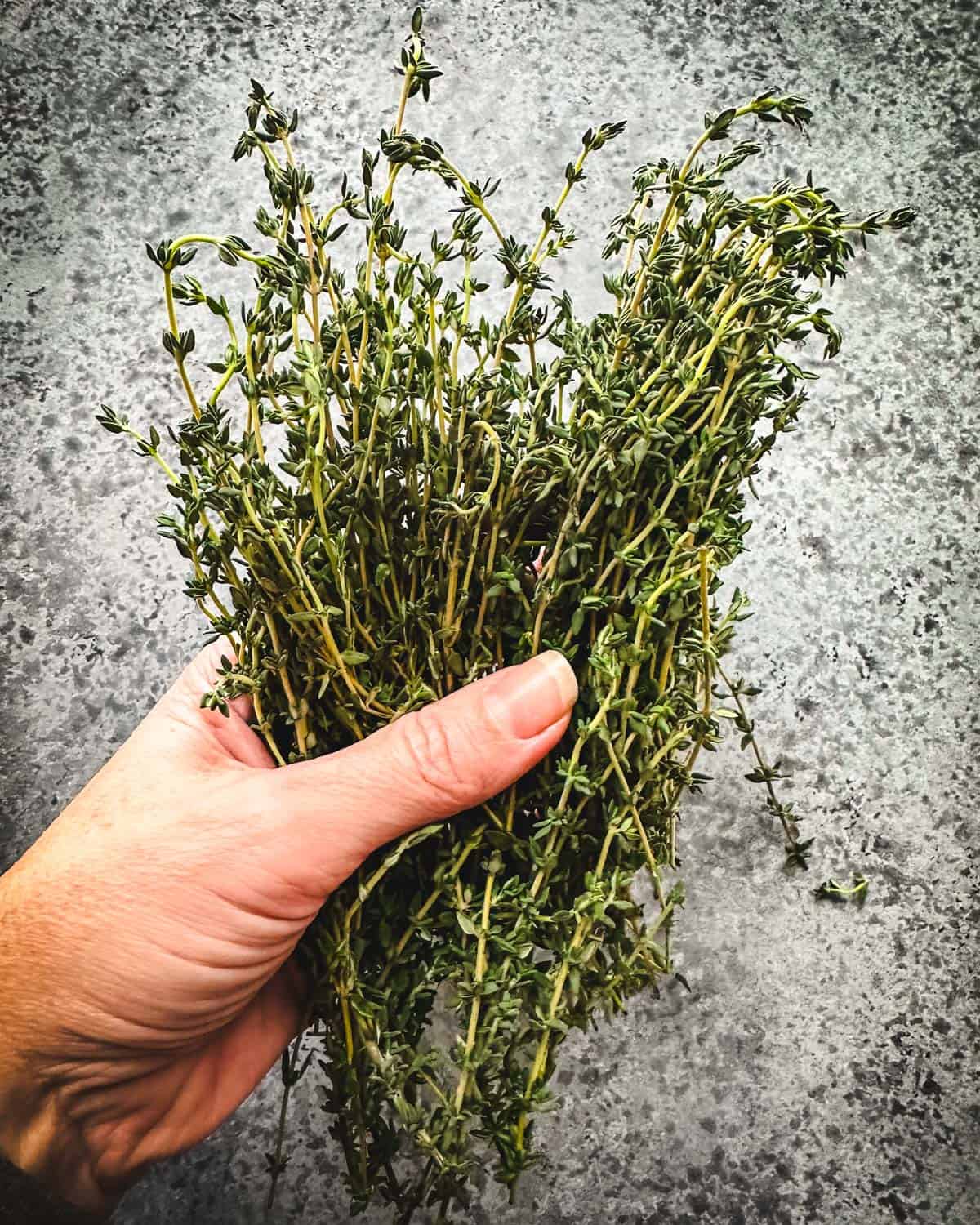
Thyme is a wonderful herb that has many uses in traditional herbalism. It’s full of vitamins A and C and can help promote healthy digestion with a variety of essential nutrients.
Historically, thyme was used to medicate bandages before the invention of antibiotics, and studies have shown that this method would be effective, considering the plant’s antibacterial and antimicrobial properties.
This particular recipe will use thyme’s antispasmodic and bronchodilator properties, which, when compared to a placebo, were shown to reduce coughing fits 50% more and two days earlier. To sum it up, this means that it is very soothing for persistent coughs!
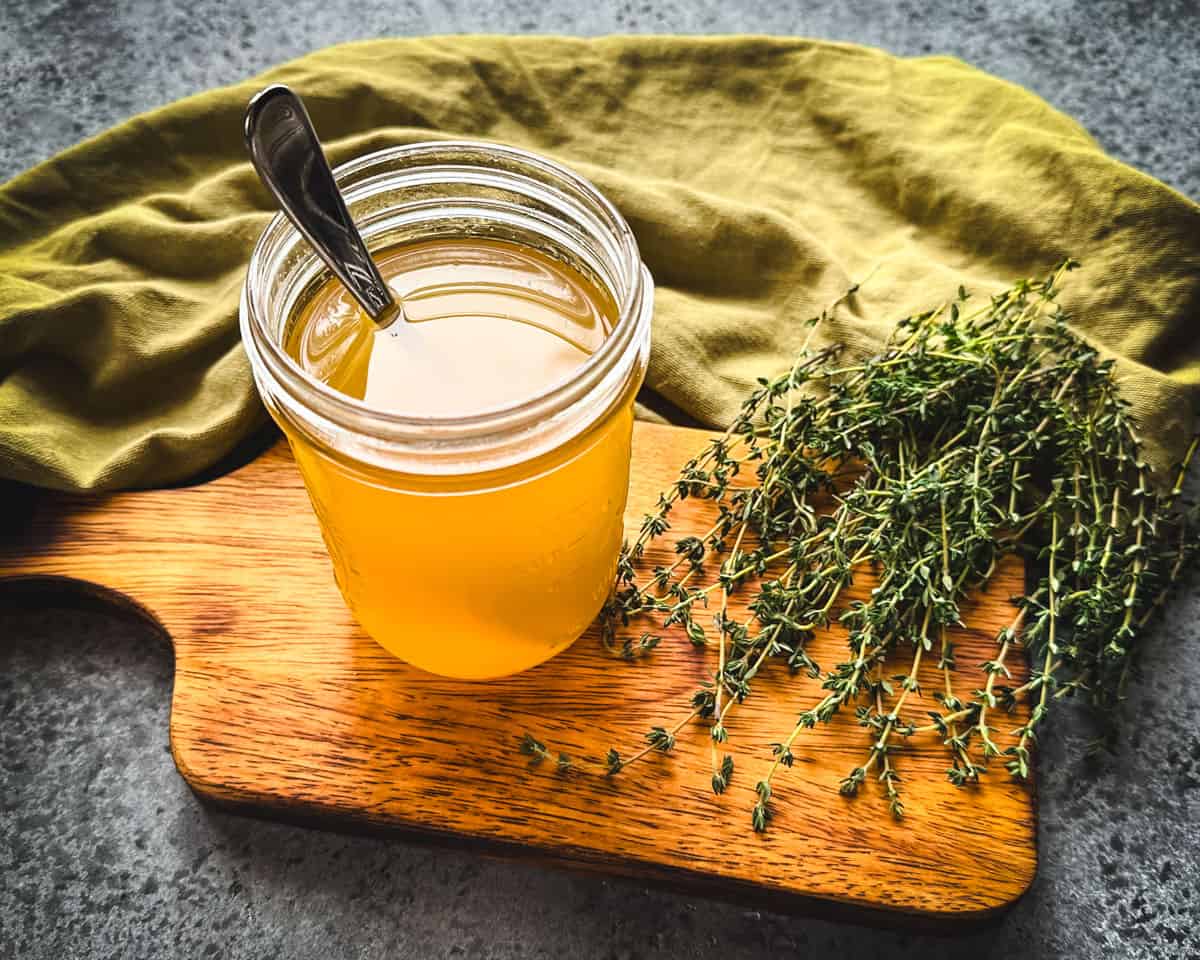
Get more winter wellness recipes for teas, infusions, syrups, honey ferments, oxymels, and gummies in my ebook Herbal Immune Support: Homemade Recipes for Wellness!
Thyme Cough Syrup Recipe
This is an easy-to-make cough syrup recipe that also tastes delicious. Honey and lemon are already a popular pair for a cough-soothing recipe, but thyme is also really useful to add for its herbal properties.
This recipe combines thyme, honey, and lemon together for an excellent homemade herbal cough syrup. Thyme cough syrup will help soothe coughing when you need it most, so keep it on hand all season!
Ingredients
Fresh thyme sprigs: Use either thyme from your herb garden or from your natural grocery store in the refrigerator section.
Ingredient note: If you don’t have access to fresh thyme, it’s okay to substitute it with other kitchen herbs with herbal properties, like fresh sage, rosemary, or oregano. However, thyme is especially good as a cough remedy.
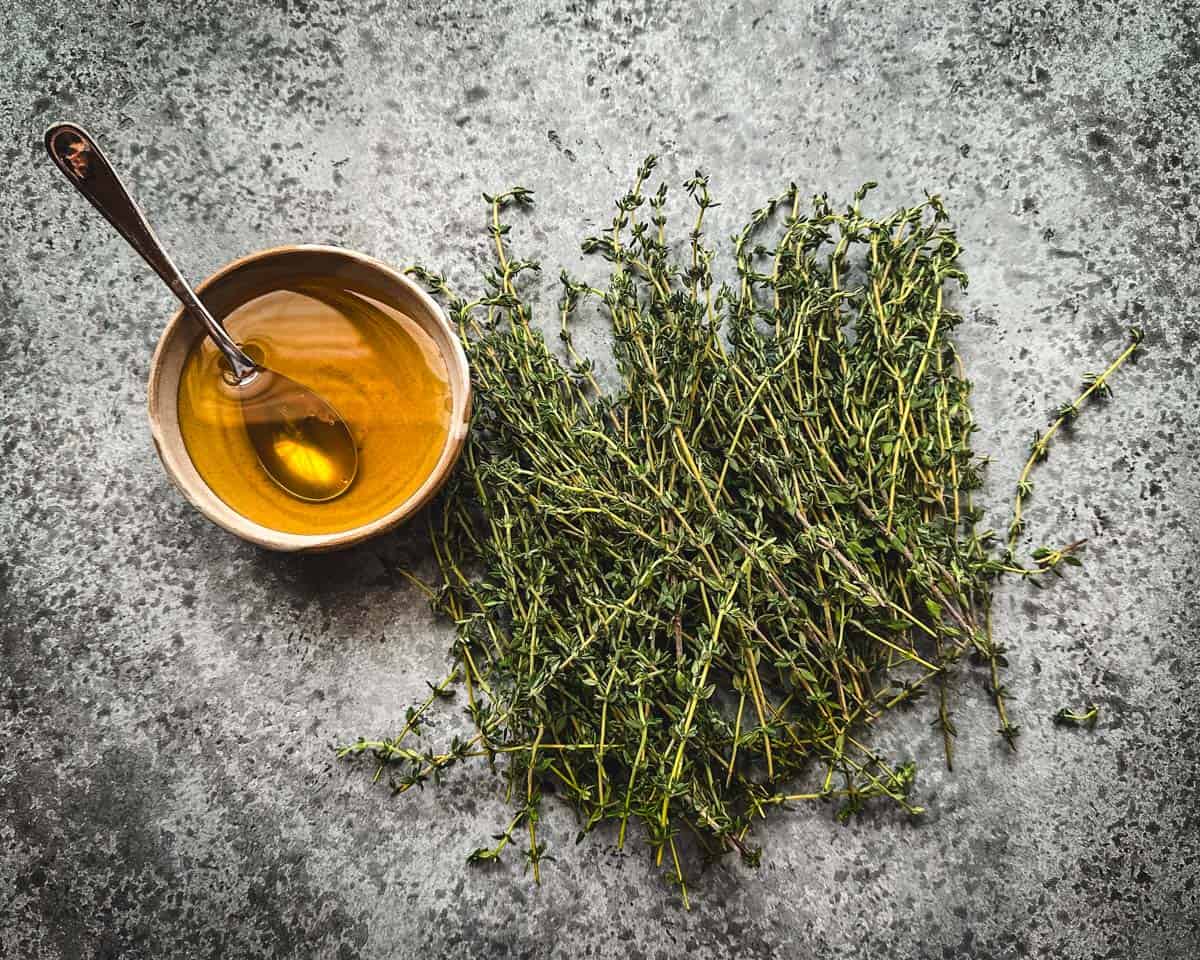
Raw honey: It’s important that the honey you use is raw and not traditional pasteurized honey, so it has all of the helpful live properties. Honey is a great throat soother!
Lemon juice: I recommend freshly squeezed lemon juice for this recipe to get the most vitamins and benefits.
How to Make Thyme Herbal Cough Syrup
First, put the fresh thyme into a pint-sized mason jar. Using another container is okay as long as it’s heat-proof.
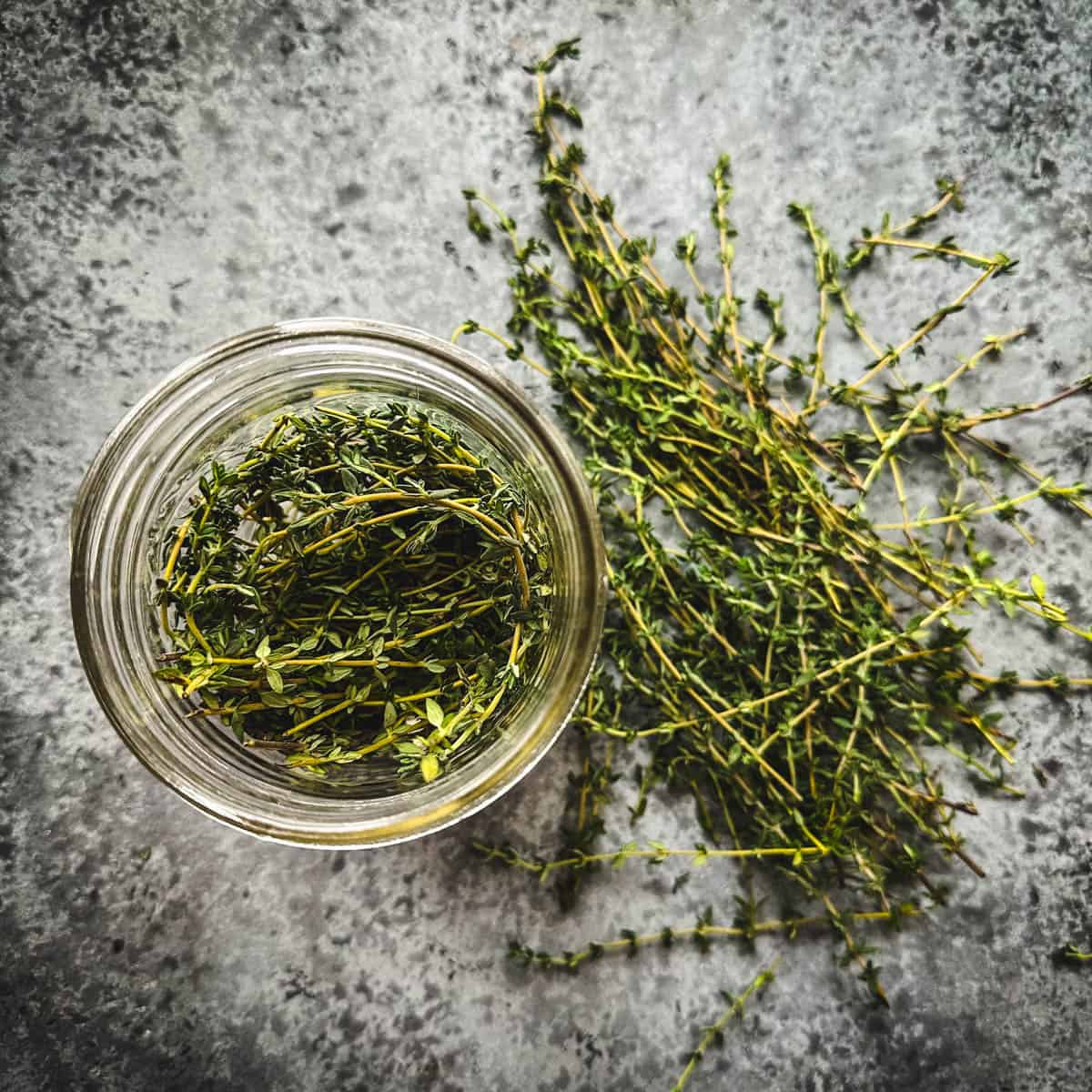
Next, bring the water to a boil and pour it over the fresh thyme. Let the thyme infusion steep until the hot water cools all the way to room temperature.
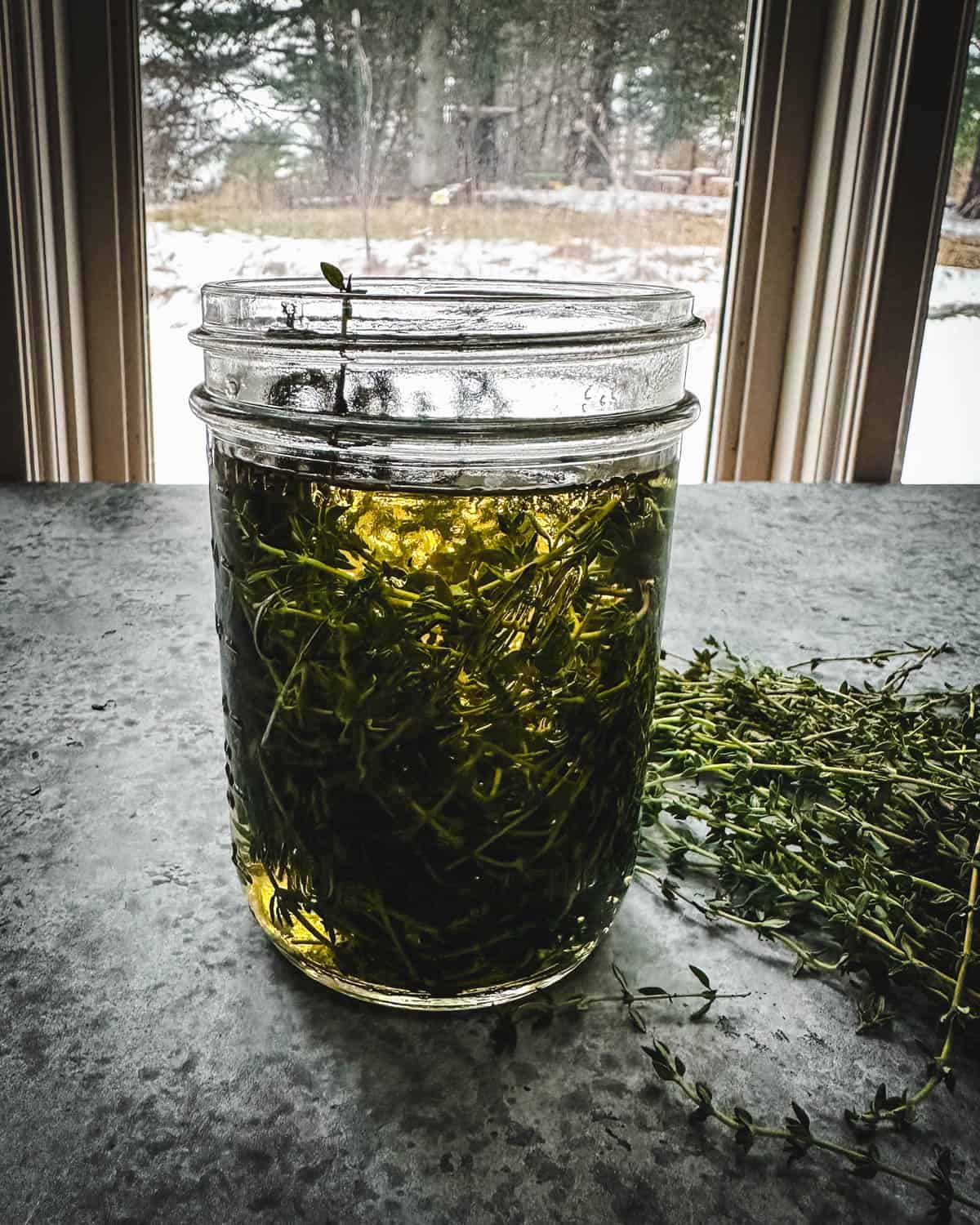
Then, strain out the thyme with a fine mesh sieve to reserve the infusion.
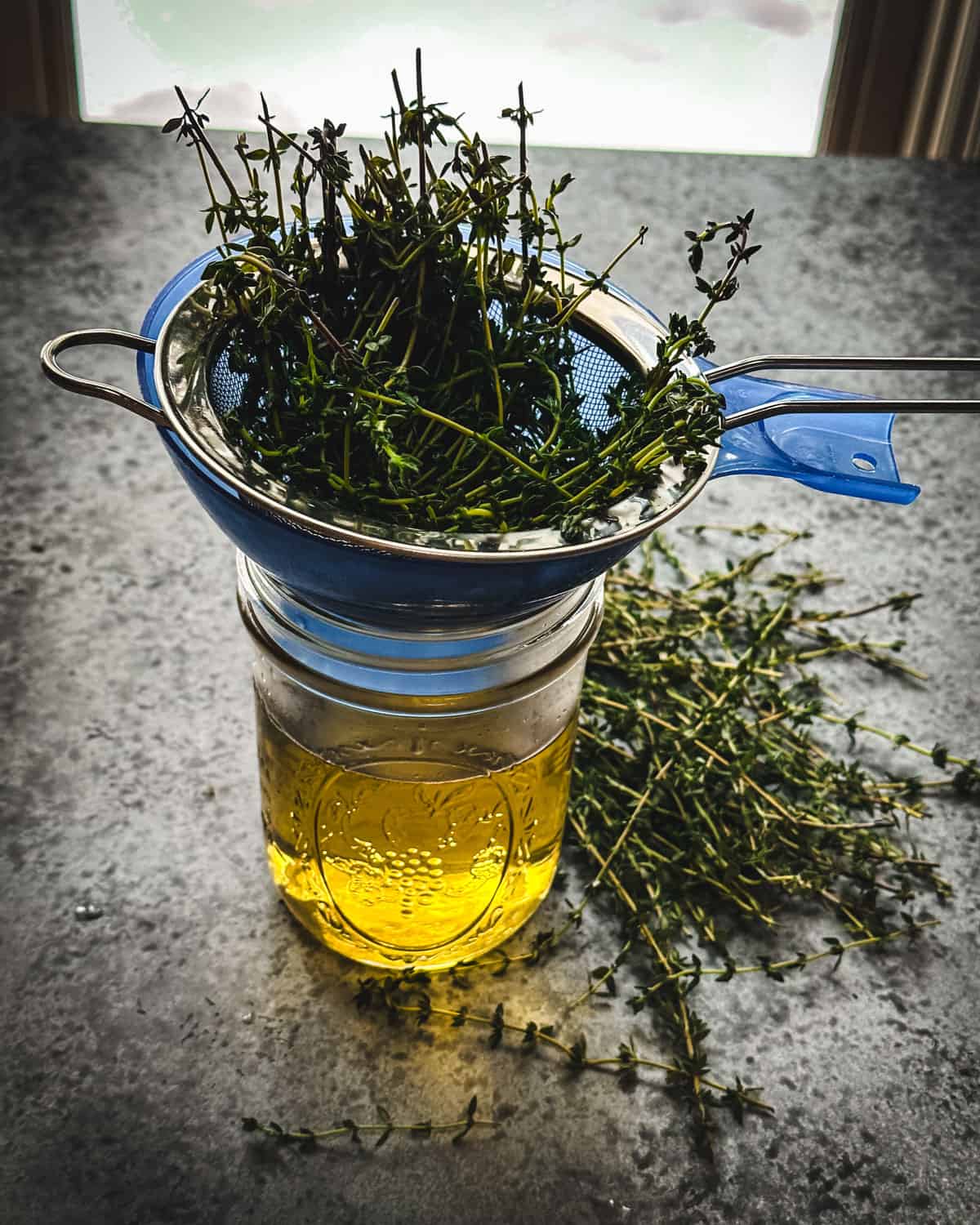
Now, stir in the raw honey until it dissolves while the thyme infusion is still warm.
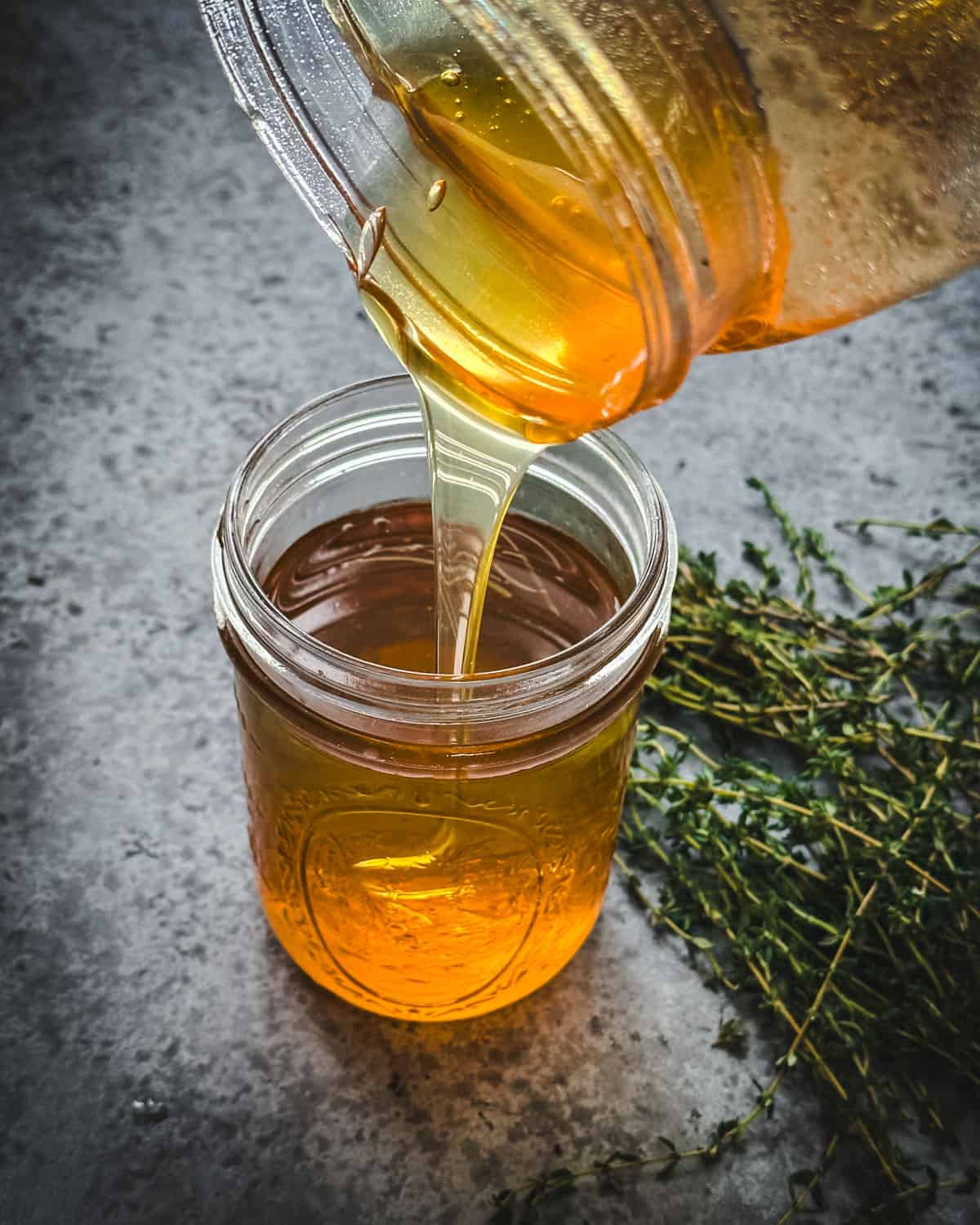
Now stir in the lemon juice. I personally find that the juice of ½ lemon works perfectly for me. However, you can adjust this to your own taste preference if you want more or less.
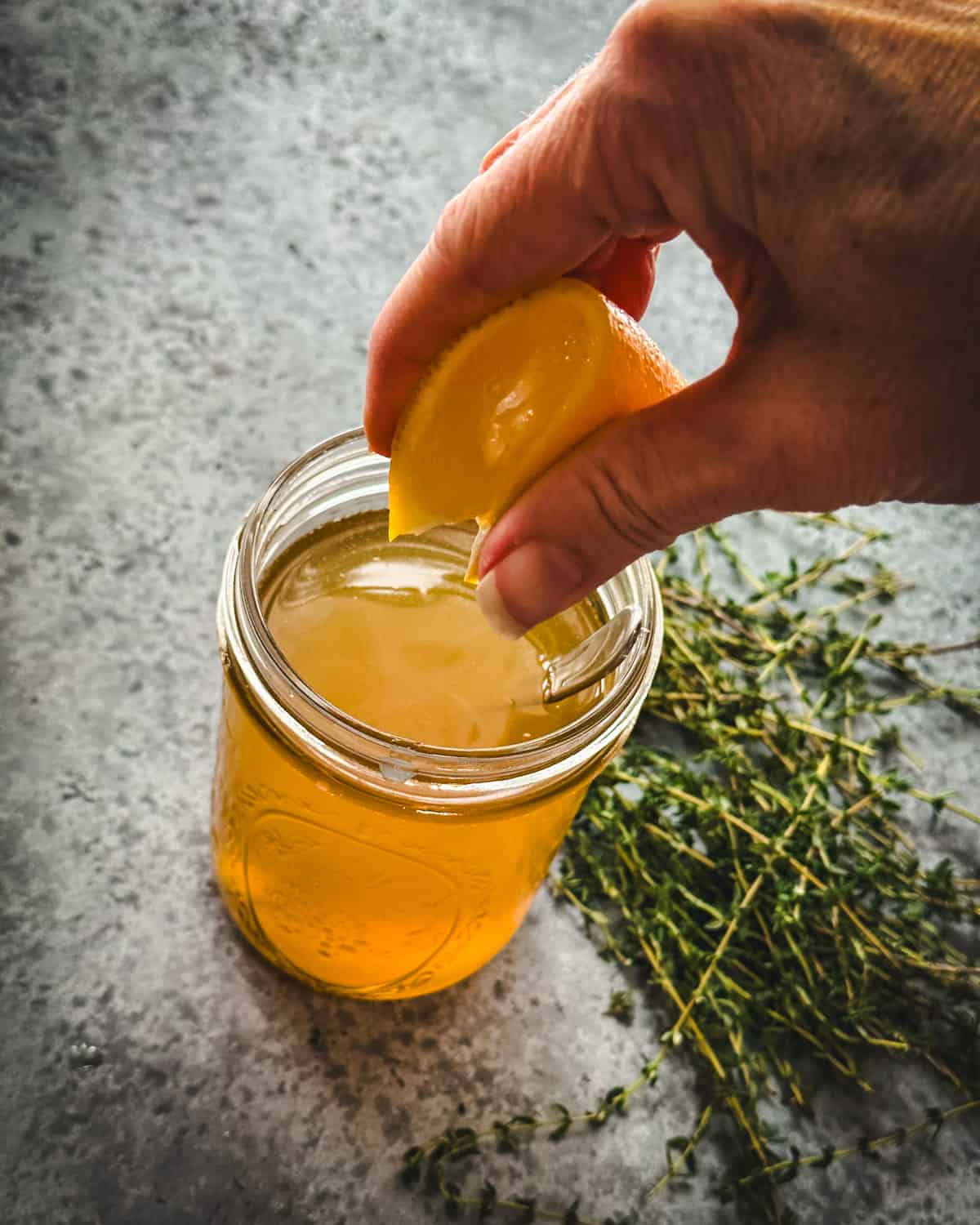
How to Use and Store
To use thyme cough syrup, take one tablespoon as needed to soothe a cough. This syrup works exceedingly well for a dry cough and is also an expectorant for other types of cough.
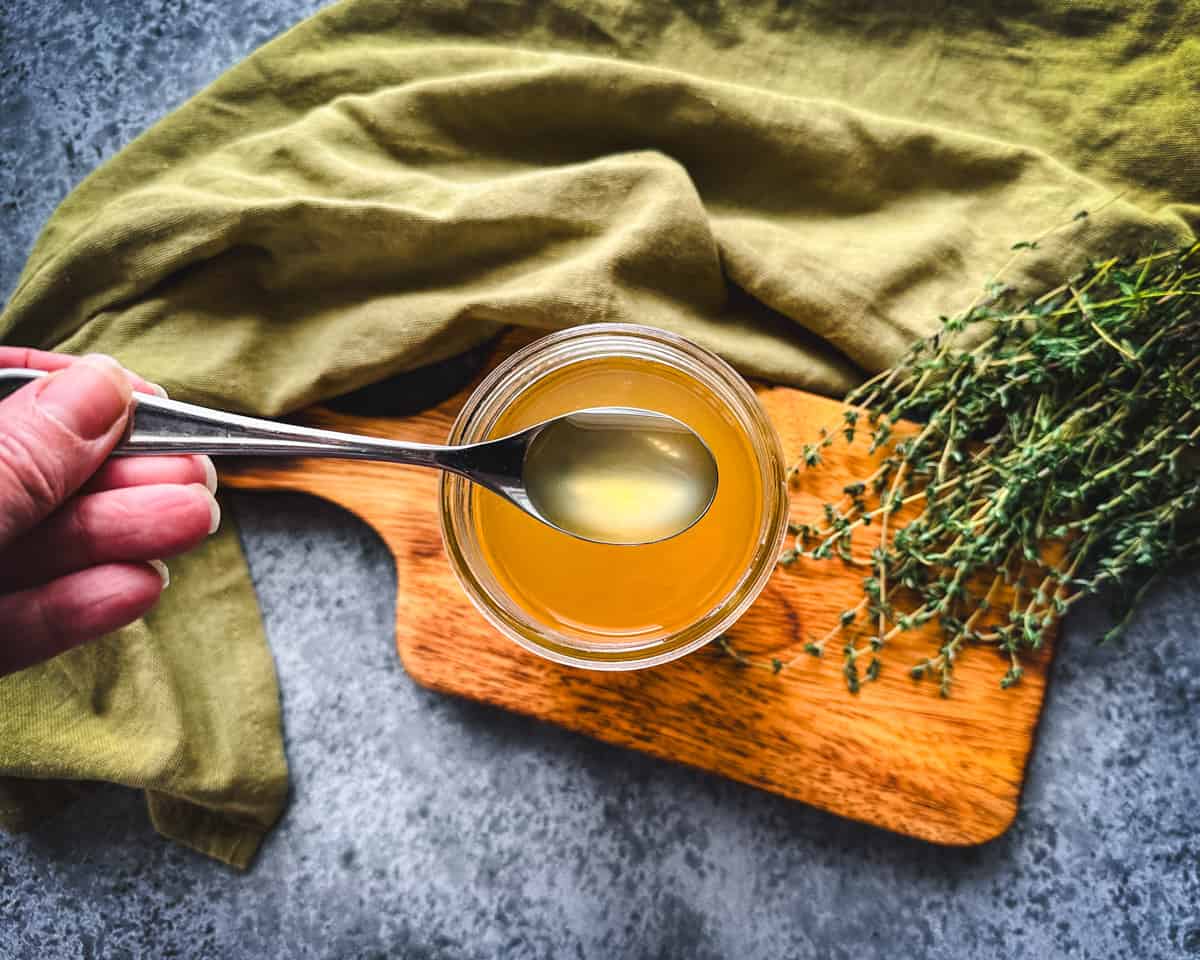
You can also use thyme herbal cough syrup to soothe a dry, scratchy throat, whether it’s caused by a virus or seasonal allergies. It’s super tasty, making it a nice way to ease symptoms.
Important note: This cough syrup is safe for children ages one and older. It should not be given to children under the age of one due to the raw honey.
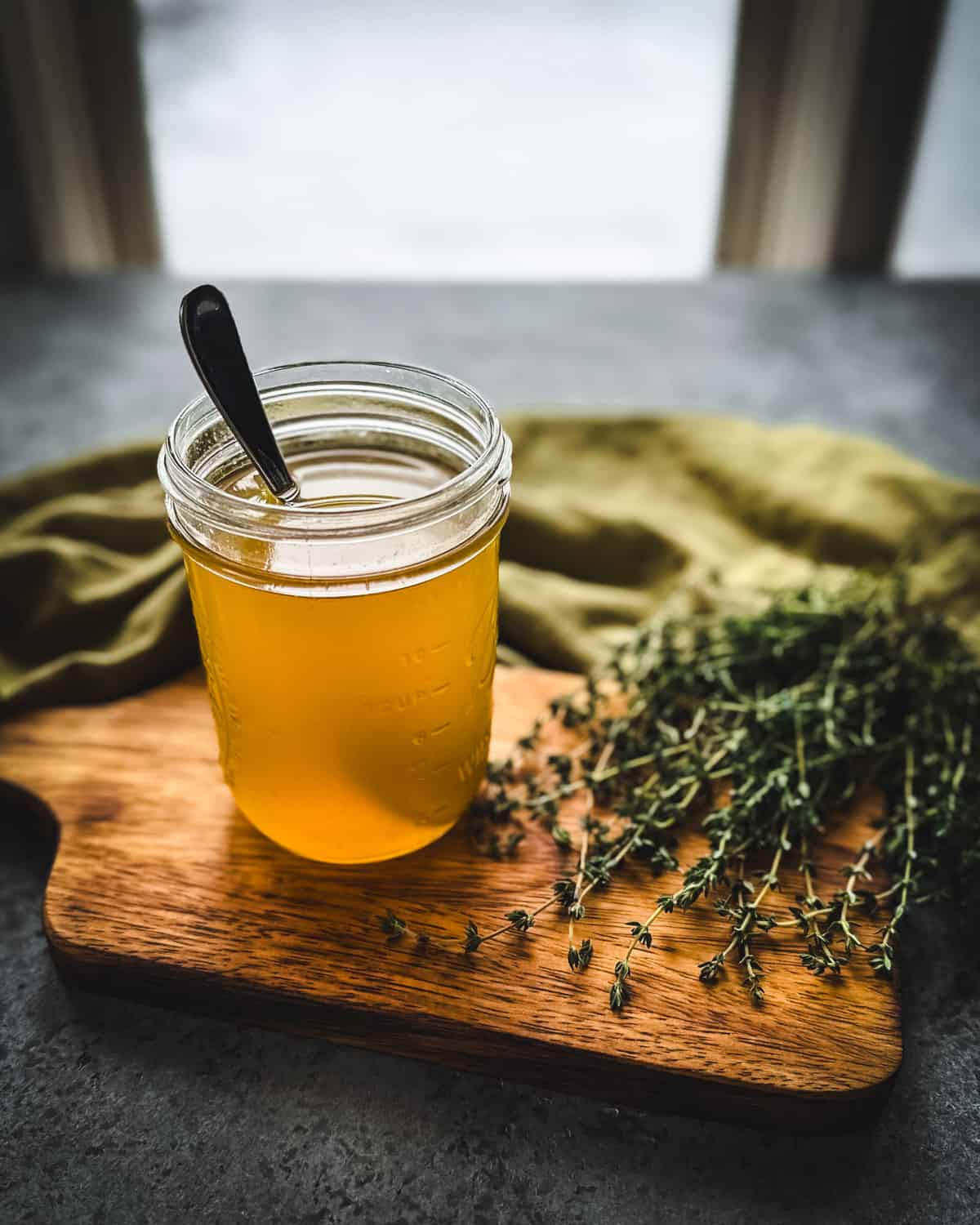
Store thyme cough syrup in a covered jar in the refrigerator and use it within 2-4 weeks.
To keep the syrup for longer, freeze it in baggies or ice cube trays. That way, you can just thaw as much as you need to use it whenever a cough or other symptoms arise!
More Herbal Syrup Recipes
- Dandelion Syrup
- Rhubarb Syrup
- Wild Violet Syrup
- Rose Hip Syrup
- Pine Needle Cough Syrup
- Forsythia Syrup
- Elderberry Syrup
- Lilac Syrup
More Herbal Recipes
- Pine Needle Cough Syrup
- How to Make Elderberry Syrup
- Rose Hip Syrup
- Self-Heal Oxymel
- Aronia Berry Oxymel
- Lemon Balm Tincture
- Sage and Ginger Oxymel
- Dandelion Root Bitters
Thyme Cough Syrup
Ingredients
- 1 1/4 cup water
- 1 handful fresh thyme sprigs
- 1 cup raw honey
- fresh squeezed lemon juice to taste
Instructions
- Put the fresh thyme into a pint mason jar (or another heat-proof container).
- Bring the water to a boil, then pour it over the fresh thyme.
- Let the infusion steep until the water has cooled to room temperature, then strain out the thyme and stir in the honey.
- Stir in the lemon juice. I find the juice of ½ lemon works well, but you can adjust this to your taste preference.
- Store the syrup in a covered jar in the refrigerator, and it will keep for 2-4 weeks. To increase the shelf life of this syrup, freeze it in baggies or ice cube trays and then thaw it as needed before use.
Notes
- Many kitchen herbs have medicinal uses and could be substituted for thyme, such as sage, rosemary, or oregano. Thyme is especially good as a cough remedy, however.
- Take one tablespoon as needed to ease a cough or to soothe a dry and scratchy throat.
- This syrup is safe for children ages one and older.
- This cough syrup should not be given to children under the age of one due to the raw honey.





Hi! Can you please tell me how much dried thyme to use in this recipe? I see it said 1 tablespoon at least but they asked for a child so I wasn’t sure if it’s the same.
1 teaspoon of dried thyme for every tablespoon of fresh thyme. I just used a handful, not a precise measurement, so I would probably guess 2 tsp. of dried thyme would be plenty.
There is a wild thyme that grows in the Caucasus mountains that people use medicinally for coughs and chest colds. I grew up with it. Any variety of thyme seems to have the same effect.
Is the container lidded when steeping the thyme in hot water? Thank you.
You can do either, but I tend to put the lid on.
What would you replace honey with to make it vegan suitable? 🤗
You can replace the honey with maple syrup or agave syrup. Maple syrup is a good choice because it has a similar consistency and soothing medicinal properties. Just keep in mind that it may alter the flavor slightly, but it will still be effective and delicious!
I am planning on doubling the recipe adding a little garlic and vodka to make this last through Fall and winter. I am assuming this won’t damage the properties of the rest of the ingredients. Thoughts?
I haven’t tried it, but I think it should be fine.
Thank you for the recipe. Coukd I make this shelf stable by combining the syrup with a thyme extract?
You can do that, but I’m not sure how the thyme extract would make it shelf stable?
I wonder if, if left out for long enough, it might become a lovely vinegar? Or does the lemon prevent the right microbes from settling in and converting the honey through the proper fermentation process?
Do i throwing the thyme away once it is used
Yes. You are extracting much of the flavor and beneficial properties of the thyme, so there’s not much use for it after making the syrup.
Wow! This works! Thank you so much for sharing this recipe. It’s my go to for a cough
How much dried thyme can I use for this recipe for a child?
I would do at least a tablespoon, since dried thyme is stronger than fresh. And just be aware, raw honey should only be given to kids over a year old.
Love this! Is there a recipe that uses dried thyme? I don’t always have fresh thyme on hand. Thanks!
Hi there. You can use dried thyme for this recipe. I would use a little bit less since dried herbs are more potent than fresh!